Aer Rianta tells GTR Mag it's about providing world-class experiences
As is the story with virtually any travel retailer that operates in different locations around the globe, for ARI the last 18 months have been tough, but the degree of difficulty has varied from location to location. “In some places we were in complete lockdown.. At the beginning there was one focus and that was to protect everyone’s health and safety,” says Nuno Amaral Chief Operations and Business Development Officer, Aer Rianta International (ARI). “Unfortunately, we had to make some difficult decisions because we were closed and there was no trading at all. We had to protect our cashflow, and survival mode kicked in. We are now open everywhere, even in the smaller airports. With all our airports open we are fortunate to have managed the situation well and be able to come through this pandemic with a robust balance sheet.”
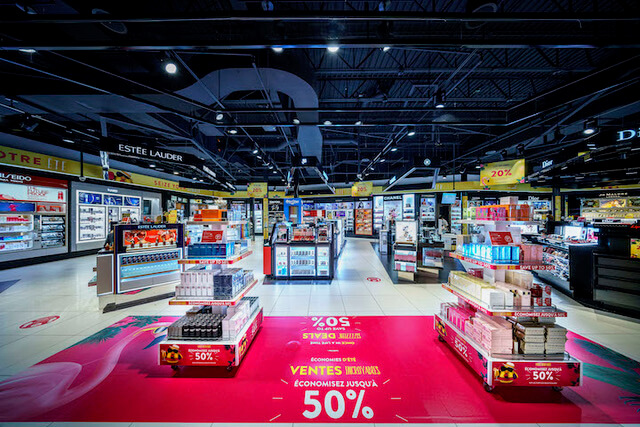
ARI already had a strong digital presence drove its expansion during the pandemic, actually launching a new website in Canada at this time
Amaral says the next step is to build towards the future, consolidate the company’s position and continue to deliver on ARI’s newly redefined customer value proposition. “We continue to analyze if there might be any fundamental changes in the way customers behave in the future. We will be dialing up some initiatives and strengthening some areas we believe will be even more important than they are now, like sustainability, exciting in-store experiences, great savings and value for our customers convenience and hyperconnectivity. And obviously we are working on our retail standards, ensuring that passengers in our shops have an exceptional experience in every location, every single time. We want to provide some sense of normality in terms of getting back to the joy of retailing and shopping and providing joyful, world-class experiences for our passengers across all channels. That's what we're focused on right now.”
Equitable risk
A common refrain throughout this time has been the need to change the business model between operator and landlord to one that is more equitable, and this thought has also been in Amaral’s mind. “I do have those debates all the time internally, and it's an very good question. During the pandemic we had excellent collaboration between everyone in the famous trinity. We pride ourselves on the relationships we have with our airport partners. Sometimes those relationships are not without challenges, as there are contracts with high MAGs and high concession fees. In reality during the pandemic I think everyone came together to support each other and we got substantial relief from airports, which we are extremely grateful for. I think the airports understood and suppliers also understood in terms of accepting a lot of product back. They accepted some stock back and we worked with them on promotional activities, so I think that everyone worked very collaboratively during the crisis.”
The question now is how to move forward. Amaral says: “We feel there is an understanding that for all of us to revitalise this industry and build back better; we need to continue to cooperate like that. Together we can create a much more seamless passenger journey and maximise our collective revenue opportunities.
“We believe there is room to change the model and work more collaboratively. We are trying to work on contractual arrangements that ensure the risk is more balanced and also ensure that the airport has a say. So we are going for a model that includes joint ventures with airports directly. We want to be all rowing in the same direction, working towards maximising the consumer experience and the profit per passenger.”
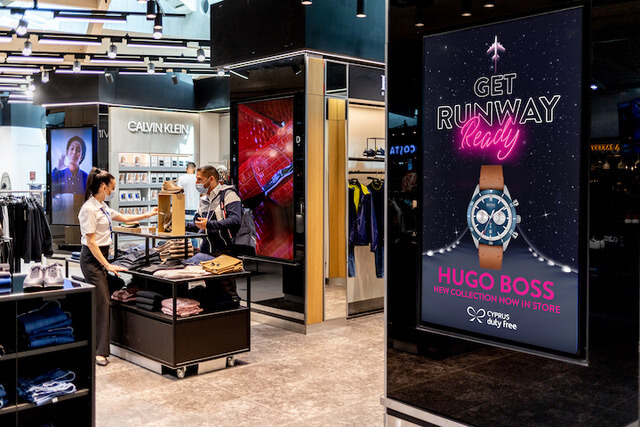
Get Runway Ready, in Cyprus, which was one of the busiest locations in Europe this summer
Regional and global
Just as impacts of the virus have been different around the world, so too have levels of recovery — based not only on the virus itself but also on politics and differing opinions of how to manage public health and a given nation’s business.
As an average across the board, ARI is at about 50% the company’s 2019 figures, says Amaral. “We're actually growing above passenger growth, so overall we are seeing steady recovery. This is different in terms of regions around the world. We are seeing good recovery in Europe and now in the Middle East, much slower in the Americas and then very slow recovery in Asia Pacific. New Zealand is at the moment completely closed. They opened the trans-Tasman bubble for a few months so we saw some good numbers, but when cases started in New Zealand and Australia they decided to go into lockdown again. In the Middle East too we saw several peaks and troughs of in terms of recovery as governments opened up and then closed because of new variants coming in.”
Lifting restrictions
Amaral likes the travel certificates, which opened Europe up to travel over the summer. “It's been a mixed bag of performance but overall I would say we're moving in the right direction. We’re really hopeful that this upwards trend will continue. Now with the US opening up and more people being vaccinated, we hope that governments will continue to lift restrictions.”
He is pleased to see travel restart wherever government restrictions have been lifted. “If you go back 18 months ago no one really knew if travel was going to happen again. Some sceptics were saying, well this might be the end of this industry — people will never get in an airplane again sitting next to someone they don't know because they will be afraid, so this could be the end of this industry as we know it. But we always remained optimistic at ARI. Our industry has had some devastating blows before and bounced back with the upmost resilience, as it turns out, this time is no different; people are looking forward to getting on planes to visit their loved ones or go on business trips or go on holidays. Not only are they booking the flights and then traveling, they also spending more than they used to. We know there is an element of pent-up savings and we are certainly seeing an element of revenge spending, with people getting that buzz of shopping again. We hope that will continue for some time still. The challenge is for us as operators to maintain these levels of spend through our value proposition.”
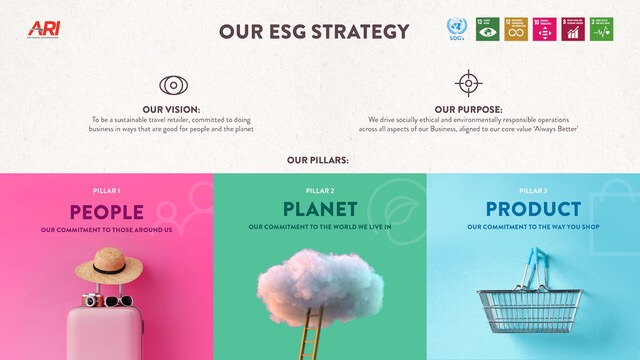
ARI’s ESG strategy has three pillars. first, the people pillar, focused on our people and our communities where ARI is integrated; then the planet pillar, which is all the company initiatives around protecting the planet; finally the product pillar, which looks at reduced water usage and other sustainability-led practices
Asian outlook
While Hainan and China have been the focus for many companies, Amaral says ARI is looking elsewhere in Asia, though the company is staying open to the possibility of partnerships in China. “China is an extraordinary market, but I think it's not without its challenges. As soon as Asia as a whole starts opening up, it is definitely a focus market for us. This is a very large continent and obviously has very different realities, but we have strong presence in a few places; we have very strong presence in India for example. We want to expand our presence in South East Asia as well. So definitely Asia is a focus market for us, just not specifically China. That being said, ARI has a proven track record of success right across the globe, and if an opportunity arises that makes sense for us, of course we will explore it – we will not bid just to drive revenues up; we want to ensure we are selective in terms of maintaining a profitable, sustainable business model.”
Downtime focus
Two areas that companies tended to focus on during the quiet time imposed by the pandemic were their digital offerings and sustainability initiatives. ARI already had a strong digital presence with award-winning e-comm platforms, but did drive its expansion in this area. “We actually launched our new website in Canada during the pandemic. The numbers have been small up until now because the business was almost completely closed up until a few months ago, but we did launch it during the pandemic and initially we saw some good results at the scale that that we might have expected. Our goal is to create a seamless experience across the customer journey, and we want to deliver our digital marketing strategy seamlessly with our world class e-commerce platform, really capturing the mindsets of travelers before they come to the airport.”
ARI reframed and relaunched its sustainability strategy during the pandemic. “We already had a sustainability strategy, but we framed it more as an ESG approach,” says Amaral. “We have three pillars in our ESG strategy: First, the people pillar, focused on our people and our communities where we are integrated. Next we have the planet pillar, which is all our initiatives around how do we protect the planet, how we reduce our CO2 footprint; how do we work with sustainable materials; how do we offer options to our customers, whether that might mean a vegan option or a non-modified product; so definitely having more options for customers. And then we have the product pillar, where we are looking at reduced water usage and other sustainability-led practices. We are very focused on driving this agenda into the future”



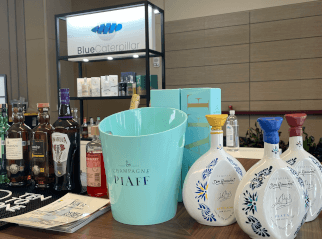

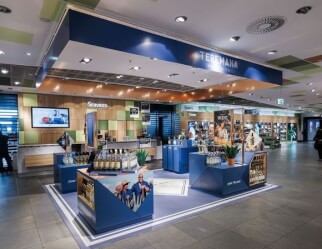


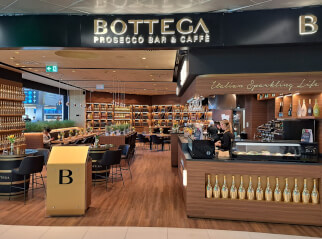
.jpg?&resize.width=322&resize.height=483)
